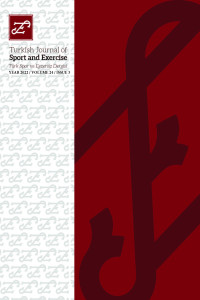Research Article
Year 2022,
Volume: 24 Issue: 3, 254 - 263, 31.12.2022
Abstract
References
- Çar B, Yarayan YE, İlhan EL, Güzel NA, 2019. Zihinsel yetersizliği olan bireylerde sporun etkilerine yönelik farkındalık: fizyoterapist adaylarına yönelik bir araştırma. Niğde Üniversitesi Beden Eğitimi ve Spor Bilimleri Dergisi, 13 (3), 267-73.
- Tekkurşun Demir G, İlhan EL, Esentürk OK, Adnan KAN, 2018. Engelli bireylerde spora katılım motivasyon ölçeği (eskmö): geçerlik ve güvenirlik çalışması. SPORMETRE Beden Eğitimi ve Spor Bilimleri Dergisi, 16(1), 95-106.
- Tekkurşun-Demir, G., İlhan, E. L. 2020. Engelli sporcularda spora katılım motivasyonu. Ankara Üniversitesi Eğitim Bilimleri Fakültesi Özel Eğitim Dergisi, 21(1), 49-69. doi: 10.21565/ozelegitimdergisi.490063
- Tevrüz, S. (1997). Endüstri ve Örgüt Psikolojisi, Ed. Tevrüz, S., Sürekli, D., 2.Baskı, Türk Psikologlar Derneği, Kalite Derneği, İstanbul, 33.
- Yılmaz A, Gümüşay A, Akkaya CC, 2021. Examination of Elite Physically Disabled Athletes' Motivation Levels of Participation in Sports. International Journal of Disabilities Sports and Health Sciences, 4(2), 86-99.
Year 2022,
Volume: 24 Issue: 3, 254 - 263, 31.12.2022
Abstract
With this research, it was aimed to measure the motivation levels of individuals with disabilities studying at Selçuk University to participate in sports. In the study, the “Motivation Scale for Participation in Sports for Individuals with Disabilities” developed by Tekkurşun et al. (17) was used and applied to a total of 87 volunteer participants, 35 women (40.2%) and 52 men (59.8%). In the study, the scanning method was used and in order to determine the differences between the variables, the Mann Whitney U test was used to compare the differences between two independent groups, and the Kruskal Wallis test was used to compare more than two independent groups. As a result of the analysis, no significant difference was observed in the motivation levels of disabled individuals for participation in sports in terms of gender and age factors. On the other hand, as a result of the analysis of the individuals' types of disabilities and the types of sports they do, there was a significant difference in the motivation levels of participation in sports. It has been determined that the extrinsic motivation levels of visually impaired individuals are significantly lower than those of physically disabled and hearing impaired individuals. In addition, it was found that the internal and external motivation levels of individuals who do individual sports are significantly higher than those who do not do any sports. As a result, the concept of motivation has a very important place in every aspect of human life. The concept of motivation is much more important for individuals with a disability, which sometimes arises due to genetic factors and sometimes by being exposed to various negative situations in the ordinary course of life. It is a very valuable phenomenon for them to express themselves in daily life, to be valued and respected, to hold on to life, and to increase their life expectancy. One of the biggest factors that gather people under one roof and support the individual both emotionally and physically in sports. It is a known fact that individuals who live their lives in a limited way are physically and psychosocially motivated by participating in various physical activities, and their situation of seeing themselves as inadequate or inadequate to other people is somewhat eliminated. With this power of sports, the life expectancy of individuals who feel inadequate will increase and their inadequacies will be felt to a lesser extent.
Keywords
References
- Çar B, Yarayan YE, İlhan EL, Güzel NA, 2019. Zihinsel yetersizliği olan bireylerde sporun etkilerine yönelik farkındalık: fizyoterapist adaylarına yönelik bir araştırma. Niğde Üniversitesi Beden Eğitimi ve Spor Bilimleri Dergisi, 13 (3), 267-73.
- Tekkurşun Demir G, İlhan EL, Esentürk OK, Adnan KAN, 2018. Engelli bireylerde spora katılım motivasyon ölçeği (eskmö): geçerlik ve güvenirlik çalışması. SPORMETRE Beden Eğitimi ve Spor Bilimleri Dergisi, 16(1), 95-106.
- Tekkurşun-Demir, G., İlhan, E. L. 2020. Engelli sporcularda spora katılım motivasyonu. Ankara Üniversitesi Eğitim Bilimleri Fakültesi Özel Eğitim Dergisi, 21(1), 49-69. doi: 10.21565/ozelegitimdergisi.490063
- Tevrüz, S. (1997). Endüstri ve Örgüt Psikolojisi, Ed. Tevrüz, S., Sürekli, D., 2.Baskı, Türk Psikologlar Derneği, Kalite Derneği, İstanbul, 33.
- Yılmaz A, Gümüşay A, Akkaya CC, 2021. Examination of Elite Physically Disabled Athletes' Motivation Levels of Participation in Sports. International Journal of Disabilities Sports and Health Sciences, 4(2), 86-99.
There are 5 citations in total.
Details
| Primary Language | English |
|---|---|
| Journal Section | Articles |
| Authors | |
| Publication Date | December 31, 2022 |
| Acceptance Date | December 23, 2022 |
| Published in Issue | Year 2022 Volume: 24 Issue: 3 |
Cite
Turkish Journal of Sport and Exercise is licensed under a Creative Commons Attribution-NonCommercial 4.0 International License (CC BY NC).


